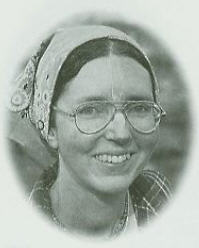
Hare Krsna Devi Dasi
IN A HOW-TO BOOK on raising a beef calf at home, a rancher presents her tips on how to make the process psychologically easier:
"I don't see how you'll ever be able to eat that little brown-eyed baby after you raise him." You'll hear this maybe from some members of your family or you may have said it yourself … [But] remember that the little brown-eyed baby will no longer be a pet by the time he is 18 months old and weighs 1,000 pounds. By then especially if he is a bull calf he probably will no longer trust humans and, except at feeding time, will come nowhere near you. … And many people refuse to give a name to any animal they intend later to butcher on the theory that the name gives it a personality. (Raising a Calf for Beef, by Phyllis Hobson)
The author's relationship with her calf contrasts dramatically with Krsna's relationships with His animals. In the book Krsna, Srila Prabhupada writes:
The cows taken care of by Krsna had different names, and Krsna would call them with love. After hearing Krsna calling, the cows would immediately respond by mooing, and the boys would enjoy this exchange to their hearts' content. (Krsna, Chapter Fifteen)
In Radha-Krsna-ganoddesa-dipika (109-110), Srila Rupa Gosvami mentions the names of some of Krsna's cows: Mangala, Pingala, Pisangi, Manikastani, Hamsi, and Vamsipriya. And also His oxen: Padmagandha and Pisangaksa. Just by hearing these names, we feel pleased to know more about Krsna and His cows.
The beef rancher is correct in her assertion that calling an animal by name gets us thinking that the animal has a personality. But besides that, we should instinctively sense that if the animal has a personality, it also has a soul and should not be killed. Srila Prabhupada confirms this intuition when he writes that consciousness attests to the presence of a soul.
The rancher, unfortunately, has missed this point. And by killing an animal, especially a cow, she blocks her chances for understanding the message of God. Srila Prabhupada writes, "Only the animal-killer cannot relish the transcendental message of the Supreme Lord. Therefore if people are to be educated to the path of Godhead, they must be taught first and foremost to stop the process of animal-killing." (Srimad-Bhagavatam 1.3.24, purport)
On a commercial farm or ranch, cows or steers have numbers (often pinned to their ears) instead of names. A cow without a name is easier to kill. But devotees don't want to kill cows, so we follow Krsna's example and give them names.
Cows and oxen like to respond to their names. A cowherd can go to the pasture and call out a milking cow from a herd. The cowherd might say, "Hari Lila, come and get your grain!" and Hari Lila will be happy to trot right over to get her grain and be milked, while the rest of the cows stay where they are.
Naturally, we all work more enthusiastically when praised for our service. That goes for cows, bulls, and oxen, too. So when we compliment them and pat them under the neck, we use their names.
Using the animals' names is part of developing a personal relationship with them and seeing them more and more as Krsna's servants. A similar principle applies in our devotion to God: when we call Him by name, we advance in our personal relationship with Him. (Of course, this is even more true for God than for animals, because His name is eternal and nondifferent from Him.) When we call God by His name, we understand that He is a person, with feelings, qualities, and activities. If I just say "God," I'm talking about the supreme entity, but according to some concepts, that entity could be just a mass of energy or even a void. But when I say "Krsna" or "Govinda," I'm speaking about a personal form of the Lord His eternal, original form, with a specific personality and specific pastimes. I instantly increase my spiritual consciousness by calling the Lord by name.
So along with a name comes a personal relationship. And a personal relationship with Krsna's cows can help us advance in realizing our personal relationship with the Lord Himself.
Hare Krsna Devi Dasi, an ISKCON devotee since 1978, is co-editor of the newsletter Hare Krsna Rural Life.
